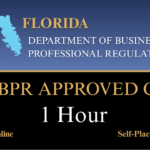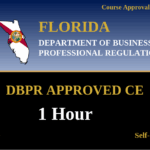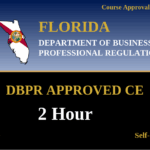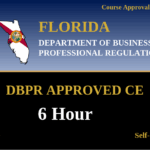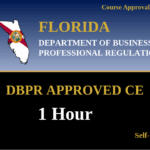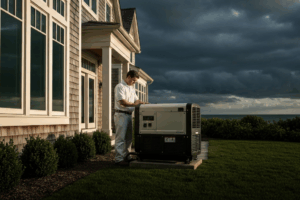
Florida Electrician CE: What You Need for Renewal
Whether you’re a seasoned professional or new to the renewal process, navigating the rules set by the Florida Department of Business and Professional Regulation (DBPR) and the Electrical Contractors’ Licensing Board (ECLB) can be tricky. This guide breaks down exactly what you need to know to keep your license active and your career on track.
Certified (EC) vs. Registered (ER): Understanding Your License Type
Before diving into the hours, it’s important to know your license type. In Florida, the state-level licenses for electrical work distinguish between two primary categories:
- Certified Electrical Contractor (EC): An EC holds a statewide license and can perform electrical work anywhere in Florida.
- Registered Electrical Contractor (ER): An ER is licensed to work only within the specific local counties or municipalities where they have demonstrated competency and hold a local license.
While the scope of work differs geographically, the state-mandated continuing education requirements are the same for both certified and registered electrical contractors. The ECLB CE requirements ensure a uniform standard of knowledge and safety for all state-licensed contractors.
Your 11-Hour Florida Electrician CE Checklist
For each two-year renewal period, all certified (EC) and registered (ER) electrical contractors must complete 11 hours of board-approved Florida electrician continuing education. According to the Florida Electrical Contractors’ Licensing Board (source: http://www.myfloridalicense.com/DBPR/electrical-contractors/), these hours are divided into specific mandatory topics. Failure to complete this coursework is a primary reason for renewal delays.
7 Technical CE Hours: The Core of Your Craft
The largest portion of your CE is dedicated to technical subjects. This ensures you are up-to-date with the latest codes and technologies that impact your daily work. These technical CE hours must include:
- Florida Building Code Advanced Module (1 hour): This mandatory course covers significant changes to the Florida Building Code, which as of December 31, 2023, is the 8th Edition (2023) and incorporates the 2020 National Electrical Code. Staying current is vital for passing inspections and ensuring compliant installations.
- Technical Subjects (6 hours): The remaining hours can cover a range of approved topics, including in-depth reviews of National Electrical Code updates, new installation techniques, and emerging technologies. For contractors who perform alarm work, a 2-hour false alarm prevention course is required and counts toward these technical hours.
4 Mandatory Professional Development Hours
Beyond technical skills, the DBPR requires training in key areas of professional responsibility. These one-hour courses are critical for running a safe and legal business in Florida.
- Workplace Safety for Electricians (1 hour): This course focuses on job site safety protocols, hazard recognition, and best practices to prevent accidents. Topics often cover new standards like those related to voltage verification. You can deepen your knowledge by exploring how NFPA 70E 2024 has changed voltage verification for electrical safety.
- Workers’ Compensation for Contractors (1 hour): This covers the laws and rules surrounding workers’ compensation in Florida, a critical topic for any business owner with employees.
- Florida Laws and Rules for Electricians (1 hour): This essential course reviews the statutes and administrative codes that govern the electrical contracting profession in the state.
- Business Practices (1 hour): This hour is dedicated to improving your business acumen, often covering topics like contracts, liability, and financial management.
Navigating the DBPR Electrical License Renewal Process
Completing your CE is the first step; reporting it correctly is the second. The entire DBPR electrical license renewal process is managed online.
- Complete Your Courses: The most convenient way to meet your ECLB CE requirements is through an approved electrician school offering online electrical courses. These on-demand classes allow you to learn at your own pace without sacrificing time on the job.
- Verify Completion: Your approved CE provider will report your completed hours directly to the DBPR. It’s always a good practice to save a copy of your certificates for your records.
- Renew on the Portal: Once your hours are reported, you must log in to the MyFloridaLicense portal to complete your application and pay the renewal fee.
CRITICAL: The electrical license renewal deadline is August 31st of every even-numbered year (2026, 2028, etc.). Missing this deadline will result in your license becoming delinquent, preventing you from legally working and leading to extra fees.
Staying Ahead: The Impact of Code and Safety Updates
Your continuing education is more than a requirement—it’s a competitive advantage. While the national electrical trade evolves with updates like the 2023 NEC, Florida contractors must master the state’s current code—the Florida Building Code (8th Edition), which incorporates the 2020 NEC. Understanding how these changes affect job planning and execution is crucial. For instance, recent NEC updates have significantly improved worker safety around equipment. Learning how the 2023 NEC improves electrical worker safety can protect your team and your business. Similarly, enhancements to NFPA 70E have redefined what goes into a comprehensive job safety plan, a topic every contractor should master by reviewing how NFPA 70E 2024 updates have changed electrical job safety planning.
A Note for Journeyman and Residential Electricians
While many electricians in Florida hold a journeyman electrician or residential electrician certification, it’s important to note that these licenses are typically issued and regulated at the county or municipal level, not by the state. Therefore, your CE requirements may differ from the state-level contractor requirements. You must check directly with the local jurisdiction that issued your license to determine your specific renewal obligations. Never assume local requirements are the same as the state’s.
Meeting your Florida electrician CE requirements on time is fundamental to your success. By planning ahead and choosing a quality provider for your online electrical courses, you can ensure your license remains active and your expertise stays sharp. Don’t wait until the last minute—start your renewal journey today.
Ready to complete your Florida electrician CE? ExpertCE offers a full range of state-approved online electrical courses to meet all your ECLB CE requirements. Browse our courses and get compliant today!
Frequently Asked Questions
- What is the Florida electrical license renewal deadline?
- The deadline for all state-certified and registered electrical contractors to renew their licenses is August 31st of every even-numbered year.
- How many CE hours do I need for my Florida electrical contractor license?
- You need to complete 11 hours of board-approved continuing education every two years. This includes 7 technical hours (with 1 hour of Advanced Florida Building Code), 1 hour of workplace safety, 1 hour of workers’ compensation, 1 hour of Florida laws and rules, and 1 hour of business practices.
Florida Continuing Education Courses
Explore our board-approved continuing education courses for Florida professionals:
View CE RequirementsFlorida 1 hour course on workers’ compensation
Florida 1 hour course on workplace safety
Florida 2 hours course on false alarm prevention
Florida 6 hours electrical CE course (Technical)
Florida 1 hour business practices course
Disclaimer: The information provided in this educational content has been prepared with care to reflect current regulatory requirements for continuing education. However, licensing rules and regulations can vary by state and are subject to change. While we strive for accuracy, ExpertCE cannot guarantee that all details are complete or up to date at the time of reading. For the most current and authoritative information, always refer directly to your state’s official licensing board or regulatory agency.

